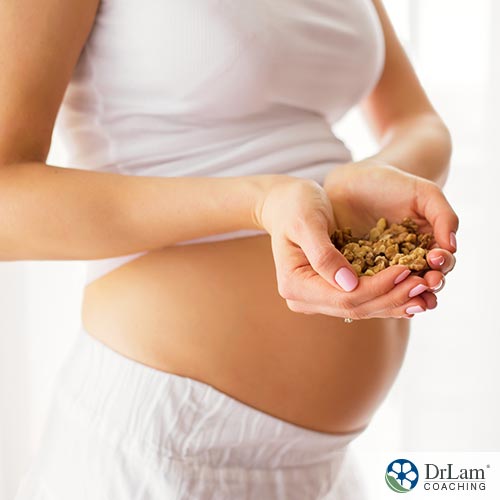 There’s a lot of controversy about the best strategies for good nutrition in pregnancy. You’ll find a lot of contradictory advice which may be incomplete advice as well. One of the most contentious issues is the use of omega 3 in pregnancy. Unfortunately, research is incomplete on this issue, which is why some medical professionals are reluctant to recommend it. However, a recent study has come out which may shed more light on this recommendation.
There’s a lot of controversy about the best strategies for good nutrition in pregnancy. You’ll find a lot of contradictory advice which may be incomplete advice as well. One of the most contentious issues is the use of omega 3 in pregnancy. Unfortunately, research is incomplete on this issue, which is why some medical professionals are reluctant to recommend it. However, a recent study has come out which may shed more light on this recommendation.
Omega 3 refers to a family of fatty acids that you must consume through your diet because your body can’t produce them. There are several different types of fatty acids in this family, and the most important are:
Omega 3 fatty acids can be found in a range of different foods including:
Omega 3 has some extremely important health benefits, which is one reason why there’s a lot of controversy about taking omega 3 in pregnancy.
There is actually a lot of research about the benefits of omega 3 fatty acids, which is why lots of people now supplement to increase their intake. Omega 3 may help to:
It’s this last one that’s of concern here. Omega 3 is essential for the development of the brain. Studies show that taking Omega 3 in pregnancy can have numerous and long-term benefits for the developing fetus. And yet there’s still a lot of controversy and argument about whether this strategy is safe for mother and baby.
Omega 3 fatty acids can also be very beneficial if you have Adrenal Fatigue Syndrome (AFS) and its associated problems.
AFS occurs when you experience chronic stress and the systems in your body that help you cope with stress become overused. When you experience stress, your adrenal glands release cortisol, which affects every circuit in the body. Cortisol is part of your NeuroEndoMetabolic (NEM) stress response. This stress response works to shut down certain functions, like reproduction and digestion, and heighten others, like the immune system and cardiovascular systems. It does this to prepare your body to fight or flee and to prepare for injury.
But most causes of stress in the modern world aren’t a predator. In fact, they tend to be tiny stressors like work pressures, environmental toxins, relationship worries, and dietary issues. Each of these factors causes a small amount of stress that accumulates. The end result can be a high level of ongoing stress that never seems to end.
If your stress isn’t alleviated, it can cause imbalances throughout the body. The adrenal glands fatigue because of their high workload and the circuits that are involved in the NEM stress response become unbalanced from the unnatural state of functioning that they’re forced into. This can be a very disruptive and frightening situation, particularly because it will cause health problems that are difficult to identify and eliminate.
 When you have AFS, it’s incredibly important that you eliminate the causes of stress. This will encourage the 6 circuits to return to their natural balance. A poor diet is a common cause of stress. And one of the best ways to eliminate that stress is by correcting dietary deficiencies. Omega 3 deficiencies are extremely common in the modern world, so increasing your intake of fish or supplementing may help correct the deficiencies and improve your AFS.
When you have AFS, it’s incredibly important that you eliminate the causes of stress. This will encourage the 6 circuits to return to their natural balance. A poor diet is a common cause of stress. And one of the best ways to eliminate that stress is by correcting dietary deficiencies. Omega 3 deficiencies are extremely common in the modern world, so increasing your intake of fish or supplementing may help correct the deficiencies and improve your AFS.
Increasing your omega 3 intake may also help address other problems that are causing stress. People with AFS often experience a whole host of problems that omega 3 may help with. These include blood pressure, irregular heartbeat, bone or joint pain or disorders, anxiety, depression, high cholesterol, and rampant inflammation. Increasing your omega 3 intakes may help reduce or eliminate some of these issues. This will decrease your overall stress levels, lower your body’s need for cortisol, and allow your adrenals to return to a lower level of functioning. And this will allow them to heal.
Increasing your intake of omega 3 in pregnancy will also have more direct effects on AFS and the health and balance of the Hormonal Circuit, particularly if you're pregnant.
Medical advice is always changing. For a long time, it was recommended that women avoid fish, or at least certain types of fish. And yet recent research is suggesting that this isn’t always accurate. In fact, there’s a growing body of evidence about how important it is that you get adequate amounts of omega 3 in pregnancy. And fish contain other nutrients that can be beneficial as well.
Fish and shellfish are good sources of iron, zinc, and protein, which are crucial for fetal development. They also contain high levels of omega 3 fatty acids. The DHA type of fatty acid is particularly important as it is found in high levels in the human brain and retina. So, ensuring a steady supply of this omega 3 in pregnancy has obvious benefits for a developing fetus, including:
 The Hormonal Circuit includes the adrenals, thyroid, and the ovaries or testes. As adrenal function declines in AFS, it quickly affects the balance of the other three components in the circuit. This often results in problems such as fatigue, low libido, infertility, PMS, and hormonal imbalances. Obviously, all of these issues will affect your ability to get pregnant and to carry the baby safely to term. This is where your intake of omega 3 in pregnancy becomes important.
The Hormonal Circuit includes the adrenals, thyroid, and the ovaries or testes. As adrenal function declines in AFS, it quickly affects the balance of the other three components in the circuit. This often results in problems such as fatigue, low libido, infertility, PMS, and hormonal imbalances. Obviously, all of these issues will affect your ability to get pregnant and to carry the baby safely to term. This is where your intake of omega 3 in pregnancy becomes important.
These AFS problems make it even more important that you try to give your body everything it needs when you’re pregnant. This means ensuring that your body has all the nutrients it needs to grow a healthy baby. If you’re lacking in essential omega 3 fatty acids it will cause additional stress, which will further unbalance your Hormonal Circuit. This will negatively affect the health and functioning of your thyroid and, even more importantly, your ovaries. And this could lead to a very dangerous situation when you’re pregnant. So, make sure that you consult with a doctor who’s aware of your AFS and the beneficial effects that omega 3 could have on your body and on your developing fetus.
New research has uncovered more benefits of taking omega 3 in pregnancy. A 2018 meta-analysis found that supplementing with omega 3 fatty acids could reduce the risk of preterm birth. However, this study had several limitations, which meant it didn’t change clinical recommendations for pregnant women.
There’s now more evidence to support this study. A recent study explored the effects of daily supplementation with fish oil from 14 to 34 weeks of gestation. Randomized subjects were given vegetable oil during the study to act as a comparison. The study found a trend towards reducing the number of preterm births before 37 weeks but no reduction in preterm births before 34 weeks.
This is only a preliminary study, but it seems to suggest a very important benefit of omega 3 in pregnancy that should be explored further. As a result, most medical practitioners recommend that pregnant women:
Many people taking an omega 3 supplement complain about its taste. Liquid OM-3 is a potent liquid omega-3 without any fishy taste. Besides being high in omega-3 fatty acids, it also has large concentrations of eicosapentaenoic acid (EPA) and docosahexaenoic acid (DHA). Both EPA and DHA are long-chain omega-3 polyunsaturated fatty acids.
EPA prevents blood from clotting easily and may help reduce pain and swelling associated with inflammation. DHA, on the other hand, may help reduce your risk of heart disease, support your inflammatory response, reduce your risk of giving birth prematurely, reduce your risk of certain cancers, and support your muscles in their recovery after strenuous exercise. It may also promote cognitive health.
Pregnancy is a joyous time of new life and growth. But it’s also a time of uncertainty and worry. You want to do the best for your child, but medical research often seems to be contradictory. If you’re worried about whether to take omega 3 in pregnancy, here’s a quick guide based on the latest research findings:
 Eating fish has several benefits for your health and the health of your baby during pregnancy and should be included in your diet if possible.
Eating fish has several benefits for your health and the health of your baby during pregnancy and should be included in your diet if possible.If you want more information on how to improve your health during pregnancy, then talk to our team by clicking here or giving us a call on (626) 571 1234.
There is some evidence that women should take omega 3 in pregnancy. However, the research is still incomplete. So, if you’re considering making any changes to your diet when you’re pregnant, make sure you talk to a medical professional first for the latest advice.
